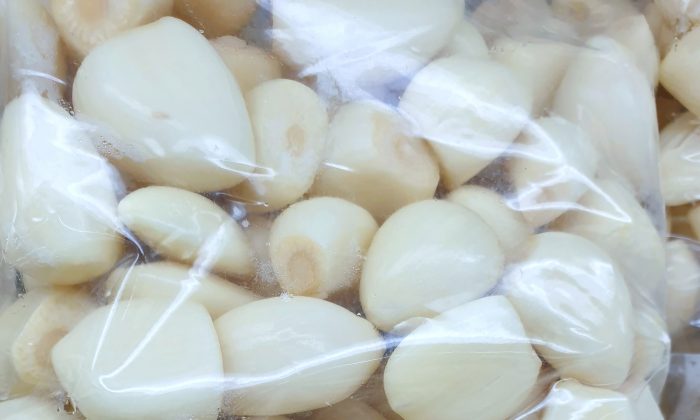Garlic is an ingredient that is integral to Asian cooking. Without the pungent flavor of garlic, Chinese dishes that require it will not taste as good as they should.
It’s not difficult to find garlic in supermarkets and markets. They often come in nice packages and look spotless. But are they really clean? Have you ever wondered where these garlic come from, and how they are processed? And why do they appear so white on the outside?

As stated on the Agricultural Marketing Resource Center’s website, China is by far the largest producer of garlic. In 2016, the country produced two thirds of the world’s 468.8 million pounds of garlic.
And that’s what’s bothering a lot of people.
In an interview with The Age, Henry Bell, of the Australian Garlic Industry Association, said garlic from China may have been treated with growth inhibitors to prevent it from sprouting on the market shelf, bleached with chlorine to achieve its flawless white appearance, and fumigated with methyl bromide—made mandatory by Chinese law—to kill insects and plant matter.
“I know for a fact that some garlic growers over there use raw human sewage to fertilize their crops,” Bell said.
Even more shocking, most of the pre-peeled garlic may have been handled by prisoners in Chinese jails, Netflix documentary “Rotten” revealed. The inmates are said to peel the garlic with their teeth when their fingernails fall off.
As per Minghui.org, a clearinghouse that publishes firsthand accounts related to the persecution of Falun Gong in China, Chinese prisons, forced-labor camps, drug rehabilitation centers, and detention centers have colluded with merchants to carry out this sinister economic operation.

The job is so grueling that by the end of the day, the prisoners’ hands, feet, and lips fester, bleed, and ooze pus, a common phenomenon.
Ming Xin, a Falun Gong practitioner in China, was illegally jailed in 2004 simply for being caught reading a Falun Gong book. Ming, although not a criminal, was forced to peel garlic at the Lanzhou City Railway Detention Center in Lanzhou City, Gansu Province.
“I had thought peeling garlic to be an easy task, but it was not at all what I had imagined,” Ming explained in a personal account published on Minghui in January 2013.
“We made finger gloves out of milk packaging to protect our fingers. Otherwise, our fingernails would crack open sooner or later, and the garlic juice would get under our fingernails and burn our skin.”
Ming adds that if they were too slow in peeling the garlic, they’d be reproached and tortured by the guards. Screaming and wailing could be heard when inmates were tortured for failing to meet their quota. Some inmates would be forced to stay up as late as 3 a.m. peeling garlic.
Moreover, they would be punished if they damaged too much garlic. “Therefore, we had no choice but to hide the damaged ones from the guards every day.”

Typically, those peeling garlic are not allowed to take a break. What has been observed by Falun Gong practitioners who were illegally detained at these jails is that the inmates vent their anger by spitting, and blowing their noses onto the garlic.
Many prisoners in Yuzhong County Forced Labor Camp and several detention centers in Gansu Province are sick. Some suffer from communicable diseases, including HIV, hepatitis, and phthisis (atrophy of body parts).
Amongst the detainees are a handful of innocent Falun Gong practitioners, who were arrested for their faith.
When these Falun Gong practitioners refuse to work, saying that they are not criminals, the guards use various cruel ways to punish them—such as shocking them with electric batons, torturing them on stretching beds, confining them to tiny solitary cells, and extending their confinement periods.
At the notorious Masanjia Forced Labor Camp, the guards ignore food safety and sanitary procedures so as to increase profit.
There, the same inmates who work on toxic export products are also instructed to peel garlic. The bags of garlic were unloaded onto contaminated work areas or the prison ground infested with poisonous chemical residue, dust, and gravel. The peeled garlic cloves were then placed into unsanitized bowls and basins that were used to hold toxic arts and crafts materials.
Every year, truckloads of these contaminated pre-peeled garlic are delivered outside the forced-labor camps and eventually packaged and sold to supermarkets, hotels, and restaurants in China and abroad.

The Chinese Communist Party announced in 2013 that it would be shutting down forced labor camps and abolishing the “re-education-through-labor” system. However, Amnesty International observed the changes were just cosmetic.
In fact, the slavery of forced labor continues today, according to Wang Zhiyuan, spokesperson for WOIPFG (World Organization to Investigate the Persecution of Falun Gong).
“Many people were simply placed into prisons instead,” Wang told the Epoch Times. “The name [re-education through labor] was canceled, but there is no actual change.”

How do you feel about “Product of China” garlic now?
There are many innocent people, prisoners of conscience who are not criminals, still languishing in Chinese jails and hand-peeling garlic for export.
We hope you think twice the next time you find Chinese garlic—generally cheaper than locally grown garlic—or other cheap products that are manufactured in China.
Watch the video:
Why Jiang Zemin and CCP Persecute Falun Gong?
[VIDEO] Why Jiang Zemin and CCP Persecute Falun Gong?


